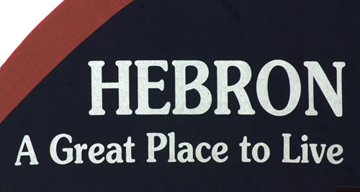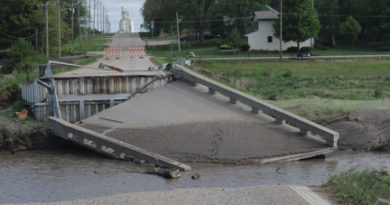Projects, maintenance, man hours raise city costs
The recent mild winter has allowed the City of Hebron to get some work done, especially underground. While snow removal equipment sat idle in city garages for most of the season, water and sewer maintenance took precedence as city workers literally dug into planned and unplanned projects.
The additional work, says Hebron city council president Larry Fangmeier, is adding up in costs, which is why he wants to tack on another dollar to the service fees. It’s apparent that money saved on snow removal isn’t enough to offset the subterranean efforts.
In the last two months, Fangmeier has warned the council they need to figure out a way to increase revenue for both utilities, soon.
“We’re doing some capital outlay, several maintenance projects and facing additional operating costs,” he said during both the March and April council meetings. “For example, we’re paying two people at the sewer plant right now.” (An additional worker has been needed at the treatment plant due to employee illness.) “If we get down to one person again, we may be able to lower any increase if it comes to that.”
Over the mild winter months, five sewer and water projects were completed within the city limits. While four of the projects were planned and completed under the mild conditions, a fifth unplanned project ironically developed due to inclement weather. During Hebron’s one of two winter storms requiring use of the snow removal equipment, a manhole at the corner of First Street and Lincoln Avenue was damaged after getting caught by the blade as workers removed snow. “We found deteriorated bricks which had forced the manhole cover up which was scraped off by the blade,” said city worker Merv White. “We had to reinforce the manhole, smooth out the area and replace the cover.”
Otherwise, the rest of the projects including storm sewer work on Lincoln Avenue near Dollar General; repair of a ten-inch main from the wells to the tower on Barger Avenue; replacement of a water main on Third Street; and installation of a new manhole on 11th Street near the school, were planned projects and completed without snow issues.
A new sewer project is set to begin this spring, however, it involves partnering with a local business. Earlier this year, MetalQuest CEO Scott Harms informed city officials he would be expanding his business, but that his present sewer system (septic tank) would not withstand additional labor forces. “We would like to hook into the city’s system,” he said.
The city, noting that Harms would need to traverse under Highway 81 to connect to their current system, decided to extend the line to the empty property at the very north edge of Hebron. That particular triangle of land has been slated for a community center for several years, but could also be used to attract new businesses. City officials feel the new infrastructure will only enhance its value.
As a means of getting the $50,000 job completed, the city is planning to turn to tax increment financing (TIF). TIF is a public financing method used for subsidizing redevelopment, infrastructure, and other community improvement projects. It is a method to use future gains in taxes to subsidize current improvements which are projected to create conditions for these gains. The completion of a project often results in an increase in the value of surrounding real estate, which generates additional tax revenue.
The increase in tax revenue, the tax increment, is used to finance the debt that is issued to pay for the project.
The council authorized mayor Shane Day up to $50,000 to get the sewer project going should the funding strategy be approved.



